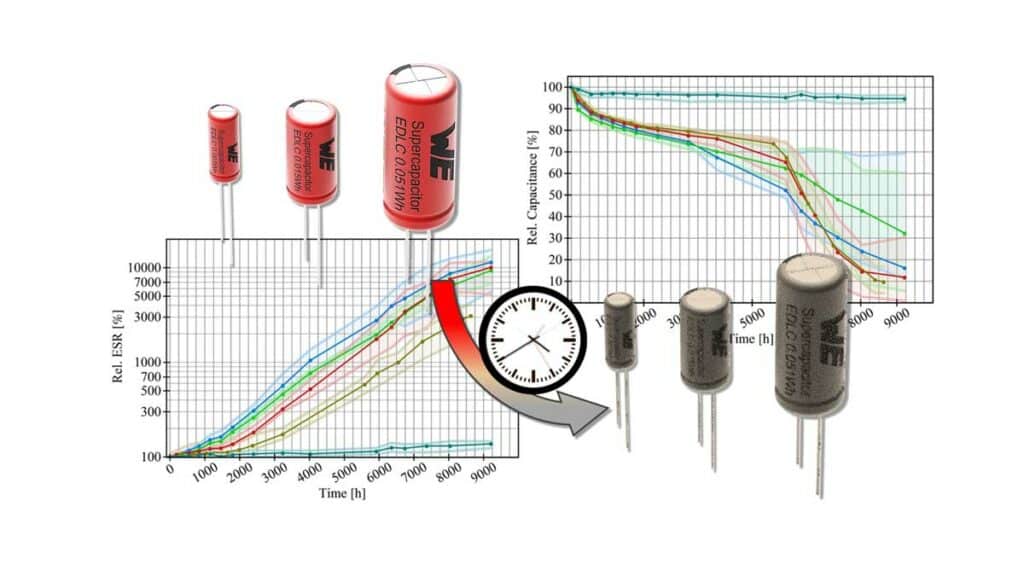This article written by René Kalbitz, Würth Elektronik published by Intelligent and Sustainable Manufacturing Journal, discussed evaluation and modeling of long-term endurance measurement on electric double layer supercapacitors to increase reliability of its lifetime predictions.
ABSTRACT: Sustainability in the electrical industry and product reliability are fundamentally dependent on product lifetime predictions. Long-term DC voltage endurance measurements at two different temperatures on various commercial electric double-layer supercapacitors are presented, discussed, and used to develop a deterioration model suitable for estimating lifetime.
Capacitors were tested under constant voltage for approximately 1 year at 65 °C and about 4 years at room temperature. To describe the deterioration in terms of capacitance and the ESR equivalent series resistance, a phenomenological model is proposed and tested against measurements taken at room temperature. The proposed model is based on a general exponential relation with a time-dependent deterioration rate.
The model is tested against long-term measurements with constant and time-dependent temperature acceleration factors. Analysis of capacitance and equivalent series resistance measurements shows a time or deterioration dependence in the temperature acceleration factor and different phases of deterioration.
Key Points
- Importance of product lifetime predictions for sustainability and reliability.
- Long-term DC voltage endurance tests conducted at 65°C and room temperature.
- Development of a phenomenological model to describe deterioration.
- Model tested against long-term measurements with both constant and time-dependent temperature acceleration factors.
- Analysis includes capacitance and equivalent series resistance (ESR) measurements.
Extended Summary
The reliability and sustainability of products in the electrical industry are critically dependent on the ability to predict product lifetimes accurately. This study focuses on electric double-layer capacitors (EDLCs), which have been subjected to long-term DC voltage endurance testing at two different temperatures: approximately one year at 65°C and around four years at room temperature. These endurance tests help understand the deterioration mechanisms of capacitors under stress.
To quantify deterioration, the study proposes a phenomenological model that describes changes in capacitance and equivalent series resistance (ESR) over time. This model is grounded in a general exponential relationship with a time-dependent deterioration rate, allowing it to account for the complex dynamics of capacitor aging. The model’s validation involves comparing its predictions against actual measurements taken at room temperature, providing insights into its accuracy and reliability.
The study also explores the impact of temperature on the deterioration process. The model incorporates temperature acceleration factors, both constant and time-dependent, to evaluate how temperature influences degradation rates. Measurements of capacitance and ESR reveal that the temperature acceleration factor itself changes over time, indicating different phases of deterioration. This time or deterioration dependence highlights the need for models that can adapt to changing conditions rather than relying on static assumptions.
Conclusion
This article underscores the importance of accurate lifetime prediction models for electric double-layer capacitors to enhance sustainability and reliability in the electrical industry. The proposed phenomenological model offers a robust framework for estimating capacitor lifespan, accounting for both constant and variable temperature effects. By validating the model through long-term endurance tests, the study provides valuable insights into the deterioration mechanisms of capacitors, paving the way for more reliable electronic products.
Read the full paper online:
Evaluation and Modeling of Long-Term Endurance Measurement on Electric Double Layer Capacitors to Increase Reliability of Lifetime Predictions; René Kalbitz, Intell. Sustain. Manuf. 2025, 2(2), 10023; DOI: 10.70322/ism.2025.10023
